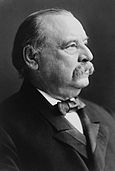imperialism and subsidies to business, farmers or veterans. His battles for political reform and fiscal conservatism made him an icon for American conservatives. His second term coincided with the Panic of 1893, a severe national depression that Cleveland was unable to reverse. It ruined his Democratic party, opening the way for Republican landslides in 1894 and 1896, and for the agrarian and silverite seizure of his Democratic party in 1896. Cleveland took strong positions and in turn took heavy criticism. His intervention in the Pullman Strike of 1894 to keep the railroads moving angered labor unions nationwide and angered the party in Illinois; his support of the gold standard and opposition to free silver alienated the agrarian wing of the Democratic Party. Biographer Allan Nevins
wrote, "in Grover Cleveland the greatness lies in typical rather than unusual qualities. He had no endowments that thousands of men do not have. He possessed honesty, courage, firmness, independence, and common sense. But he possessed them to a degree other men do not."
×
![]()
×
![]()

